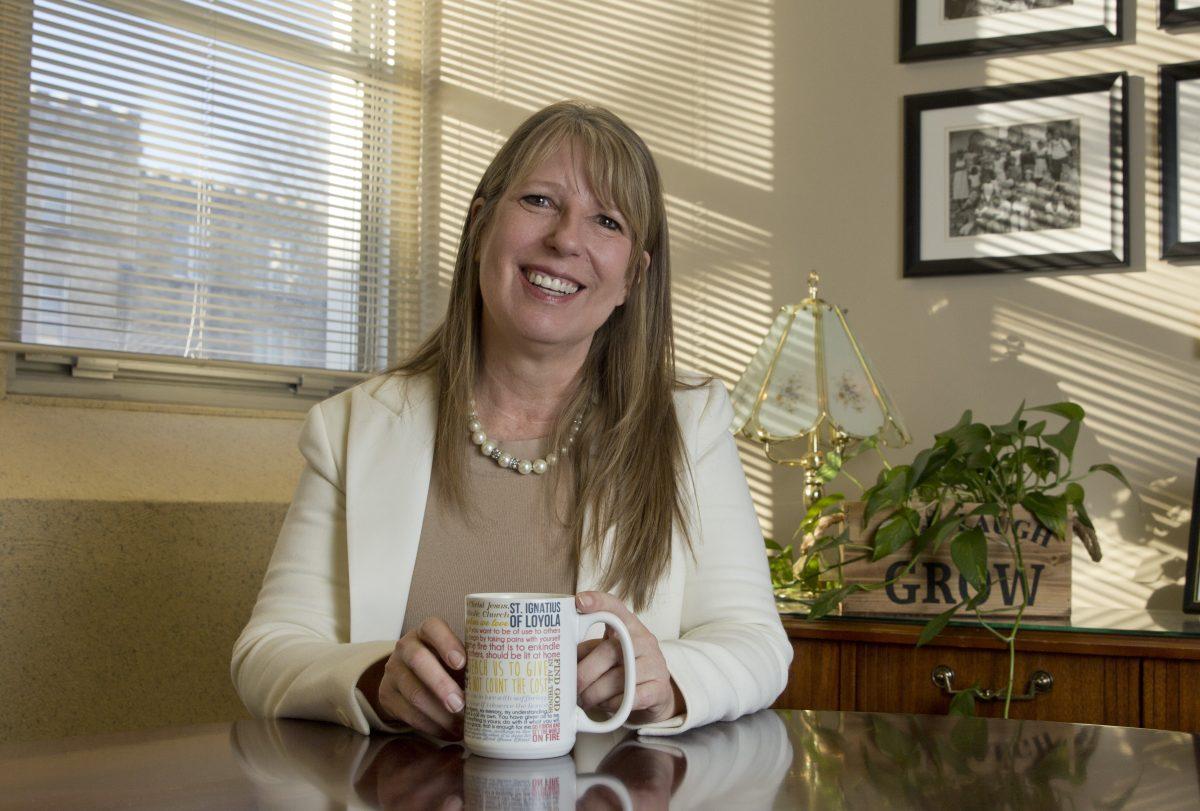Cheryl McConnell, Ph.D., was announced as the new provost and vice president for academic affairs on Feb. 13. McConnell spent the last 30 years at Rockhurst University, a fellow Jesuit institution, in Kansas City, Mo. In an email to students, faculty and staff, University President Mark C. Reed announced that McConnell would officially join Hawk Hill on June 15. With a background in accounting and
business, McConnell most recently was the associate vice president for academic affairs and dean of Helzeberg School of Management at Rockhurst University.
What prompted you to apply to be the provost and vice president for academic affairs position at St. Joe’s?
I believe in the shared mission of Jesuit higher education. I believe that as Jesuit higher education institutions, we have to position ourselves to meet the continuing challenges of the world. And for me, that means educating the whole person and delivering high quality educational experiences. And I know that that is happen-
ing at St. Joe’s and I know that I can contribute to shaping that for the future.
You’re coming here from Rockhurst University. Why another Jesuit institution?
Students face challenges today that weren’t faced by students a generation ago. We don’t even know the jobs that students today will have 15 years from now and, because of that, we have to remain focused on educating, not just for the current jobs that students will receive at graduation, but for the next 10, and that means a focus on liberal education, it means a focus on the core values, it means a
focus on learning how to think and reason. That to me is the essence of a Jesuit edu-
cation. Quite frankly, I don’t want to be at another institution that’s not a Jesuit institution. I want to be a leader a Jesuit institution that’s committed to those core values.
What do you see as the role of a provost and vice president for academic affairs?
The role of a provost is to provide the academic leadership and vision for the institution and to make sure that the system and the individuals and the programs are all aligned with achievement visions. It’s a complex challenging job, but I can’t imagine any job that’s more satisfying.
Small classes are an important part of the educational experience at St. Joe’s. The Jesuit Council on Rhetoric and Composition has been tracking data for writing courses, and Rockhurst has typically been towards the bottom of that list. Was that something specific to Rockhurst? Do you have plans to make sure course caps at St. Joe’s stay low?
[Rockhurst’s] are at 23. I think there’s extraordinary value in keeping class sizes small and reasonable, particularly in writing and rhetoric courses. There’s no question that there are challenges related to efficiencies in higher edu-
cation, but there are some really key things that we need to keep hold of, and certainly class sizes in writing are one of those. Specifically to your question, I have absolutely no intent of increasing class sizes in writing. Quite frankly, that is not something I would universally do, that is a conversation that I would have with faculty.
How do you plan to develop and nurture a relationship with students on Hawk Hill?
I’m looking forward to this. When you become a leader in higher education, it’s easy to be disconnected with the student experience, and I think you have to be intentional about creating those connections with the students. Whether it’s in the town halls or its going over to [Campion Dining Hall] and connecting with students in a luncheon engagement or a coffee engagement. Intentionally finding those connections. It could be participating and watching the artistic and athletic events, but it’s really important. You can’t get disconnected and still serve the students.
On Hawk Hill, you’ll be working with a group of seasoned senior administrators. How will you work through disagreements?
In Jesuit institutions there are these principles of Ignatian conversation and a couple of important principles are to listen first, listen carefully, to disagree respectfully and humbly, to search for the truth in what others are saying and to give the conversation the time it takes. That’s hard to do when you’re dealing with difficult challenges, but concentrating on that, it really comes from a place of respect and listening. There will always be disagreements but we will find a way to work collaboratively through the disagreements to do what’s best for the university.
In the fall semester, we had campus-wide protests and then conversations after a racist incident on campus. Social justice and institutional racism have become part of the national conversation. How do you plan to tackle these conversations at St. Joe’s?
We had some similar experiences at Rockhurst University, where some racist flyers were on doors. We met the challenge with open conversations and standing in companionship. We stood in the quad together, as a university, with a commitment, not here not ever. Rockhurst has completed a climate study, which I understand SJU has as well, so [I’m] committed to deeply reviewing the climate study when I get there, taking action where I can, getting together with the rest of the higher administration to make sure that campus is open and welcoming to all. Because if one person doesn’t feel at home, then no one should feel at home.
What do you think is the most productive way for college campuses to have a dialogue about racism?
I don’t believe there is one thing that is the answer. I think that it’s an approach on all fronts. There’s conversations that go on that should go on in the student life element. There’s also conversations about how we integrate the topics and have conversations within the classroom and within the academic side. It’s a deep, complicated question, and it deserves a multifaceted approach that is thoughtful,
measured and that is a deep commitment from the institution at all levels.













































